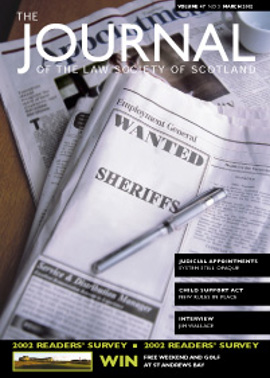Time to reinvent the law degree?
Opening up the LLB degree to three new providers could represent the opportunity to reform a syllabus that, according to a report into Scottish Legal Education in the twenty-first century, needs a more modern approach to content and the method of learning. The report concludes that “the extensive coverage of legal subjects appears no longer to be appropriate in today’s world”.
The Report to the Joint Standing Committee on Legal Education was prepared following consultation with members of the legal profession and the law schools in Scotland.
However it is arguable that accrediting Napier, Robert Gordon and Glasgow Caledonian universities to run the LLB may exacerbate one of the key findings of the Report – that as one of the cheapest forms of higher education, “law with its continuing popularity among well-qualified students and its assumed low cost, has been expected to absorb large quantities of additional students with little increase in resources”.
There have long been concerns that an excessive number of students seeking to become lawyers leads to disappointment among graduates who are unable to secure a place in the legal profession.
At present, less than 60% of LLB graduates enter the legal profession, with that figure expected to decline beneath 50% soon.
In short, a new LLB degree needs to be more relevant to equipping graduates to succeed in careers outwith the legal profession.
One of the joint authors of the Report, Professor John Sturrock QC, Director of Training and Education at the Faculty of Advocates, said: “With such a significant number of LLB graduates finding jobs outside the profession, and with that trend likely to continue, the proposals for reform of the LLB offer the opportunity to move away from extensive coverage of legal subjects to a degree which, while meeting professional requirement for the twenty-first century, also produces graduates who are even better fitted for, and aspire to enter, jobs outside the legal profession.”
The Committee also recommended “the entry standards for school leavers must be maintained at the present levels at least” – a recommendation which it might be thought could be undermined by the lesser entrance requirements of the new universities.
Liz Campbell, Director of Education at The Law Society of Scotland, said: “Numbers graduating with the Diploma are a much closer match with the number of training places available. Also, approximately 40-50% of all LLB graduates do not choose a professional career, or at least not a Scottish legal professional career. The Society’s view is that granting accreditation to additional universities opens up access to the profession to a wider sector of society and provides more graduates with an LLB degree which is a very good foundation for a number of other careers. We consider that it is important that the membership of the legal profession reflects society as a whole and widening access will assist that process.
“It is almost certainly the case that the newly accredited universities will have lower entrance qualifications than the ‘old’ universities, at least in the early stages. However, the argument could probably be made that this is inevitable as until they were accredited to offer an LLB they did not attract applications from the same level of student as those institutions which did already offer the LLB.”
A new approach to the content of the LLB degree as formulated by the Committee would flow from five suggested headings to structure the study of law. The headings - legal method, law in context, legal process, public law and Scottish private law - provide a broad framework from which the topics to be included in the degree would flow.
“The Committee believes that this approach will have a liberating effect on Scottish legal education and how we think about it and the law generally, while providing modern Scots lawyers with a more relevant and rational educational foundation which will meet the requirements of the profession in the twenty-first century. At the same time, it will provide a more relevant base for those graduates who choose not to enter the legal profession.”
The Committee also argues that, with a more flexible approach, fewer students will simply drift in to the profession and that this will help to reduce numbers entering the profession.
Also central to the report was moving from didactic teaching to facilitated learning. This is consistent with the Dearing and Garrick Reports and the QAA benchmarks, all of which suggest shifting the focus towards student-centred, case-study and problem based learning to foster more independent study and deep learning, together with “the acquisition of the skills of analysis and reasoning which we identify as often missing in the current approach”.
As John Sturrock put it, “ There have been significant changes in the law and the profession in recent years and new challenges lie ahead. Diversity of practice and complexity of the law, information technology, electronic communication, the change of culture brought about by the Parliament and human rights, the influence of European law, trends towards consensual dispute resolution, CPD and the growth of Tribunals – all of these suggest that we have entered an era in Scotland when there is an even greater need for Scots lawyers to think creatively and imaginatively, to be able to analyse legal issues in new and deeper ways and to understand the broader context in which Scots law now falls to be developed in the twenty-first century.”
In this issue
- Judicial appointments system still opaque
- Lay input fundamental to judicial appointments
- Simplifying the maintenance formula
- Time to reinvent the law degree?
- Defining distance contracts 2002 (3) 34
- London still the holy grail for Scots firms
- Scottish Solicitors’ Discipline Tribunal
- Website reviews
- Achieving client Nirvana
- Restriction of liberty orders
- Diligence on the dependence under threat?
- Where there’s a will there’s a right way
- Second(ed) thoughts on way to Brussels
- Book reviews






